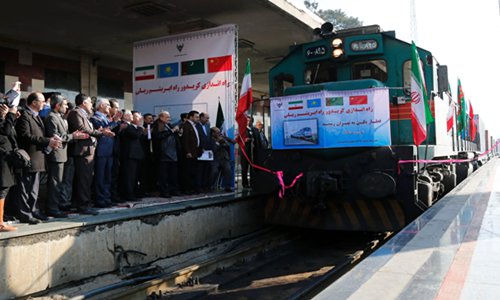
Iranian officials applaud on the platform as the first train connecting China and Iran arrives at Tehran Railway Station on February 15, 2016. File photo: VCG
Chinese companies' business appears to have been unaffected so far by the mass demonstrations in Iran but Chinese traders of small commodities said they face losses after Iranian clients halted payments for purchased goods.
A Chinese expert said that when the demonstrations calm down, China's trade ties with the West Asian country will not be adversely affected, and in fact trade might even be further promoted.
State-owned China Railway Construction Corp (CRCC) said in a stock filing on Wednesday that its subsidiary China Civil Engineering Construction Corp had struck a deal valued at 3.53 billion yuan ($543 million) with Iranian traffic authorities for the construction of a 263-kilometer railway.
On Wednesday, shares in CRCC's listed arm in Shanghai edged up 0.35 percent while its Hong Kong listed arm declined 0.32 percent, in part due to concerns over the ongoing demonstrations in Iran.
At least 20 people have been killed and dozens of others injured as protests against the Iranian government's economic and social policies continued in major cities across Iran over the past few days, the Xinhua News Agency reported on Tuesday.
Chinese investments in resource-rich Iran are mainly focused on oil and gas and infrastructure projects such as railways, but many of the State-owned companies with projects in Iran declined requests to comment about the current situation as of press time on Wednesday.
Wang Jinyan, a Chinese woman living in the Iranian capital Tehran, said she hadn't noticed any disturbance to Chinese companies, many of which have offices in the city.
But a group of merchants in Yiwu, East China's Zhejiang Province, the world's leading small commodity center, said their businesses had suffered a blow due to the current situation in Iran.
"We suffered a lot. Due to the turmoil, Iran's currency, the rial, depreciated greatly. Our Iranian customers didn't want to take foreign exchange risks and refused to complete the payment," a businesswoman who only gave her surname as Tan told the Global Times on Wednesday.
Tan's company buys kitchenware, toys, apparatus and shoes from Chinese suppliers and sells them to Iranian clients.
"A large amount of goods are already on their way to Iran. Many other goods are intended for the celebrations of Iranian New Year or earmarked for the Iranian market… We could face losses of up to 6 million yuan if these payments are not completed," Tan said, adding that there are hundreds of companies in Yiwu facing the same situation.
Unexpected benefit
Zhou Rong, a senior research fellow at the Chongyang Institute for Financial Studies at Renmin University of China, said that the current situation will not result in a government overthrow and will settle down eventually, and in the aftermath it may even present fresh opportunities for Chinese companies.
"There have been no reports of assaults on Chinese companies' offices in major Iranian cites or project sites in the provinces in the western and southern part of the country. And it seems unlikely it will happen in the future," Zhou observed.
"When the unrest settles down, the Iranian government will urgently address the stark unemployment issue, which is believed to be partly behind the unrest. It will naturally turn to infrastructure projects - an area of strength for China," Zhou told the Global Times on Wednesday.
"The relatively high education level among Iranians will also mean they stand a better chance of being employed by Chinese companies," Zhou said.
Iran is an important link in the China-proposed Belt and Road initiative, and the two countries aim to increase bilateral trade to $600 billion over the next decade, media reports said.
"Boosting connectivity within the country and tackling unemployment by rolling out new infrastructure projects will probably be part of the agenda of the Iranian government in the near future," Zhou predicted.
"With the US sanctions continuing, Iran urgently needs hard currency and can only obtain it from enhanced trade and economic cooperation with its partners. China stands as the only country that is not so much influenced by US pressure," said Zhou.
"China has so far remained on friendly terms with Iran, and there might be bigger opportunities in trade and economic cooperation in the future," Zhou noted.


